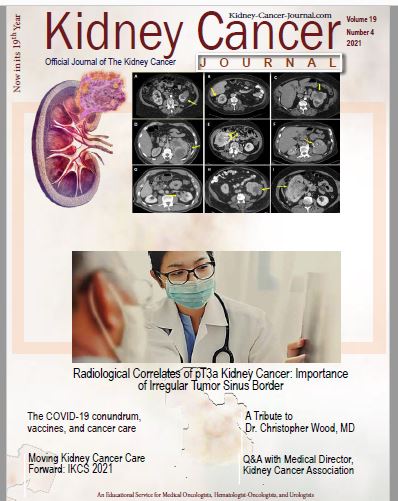
Q&A with Sallie McAdoo, MS, CGC
Medical Director, Kidney Cancer Association.
██ KCJ: You have a background in clinical genetics and medical affairs, what kind of perspective are you bringing to the role of medical director at KCA and what does this role mean to you?
Sallie McAdoo (SM): It is unusual to have a medical director that is not an MD. But we think for an advocacy group for sure my background was melding together the need for patient education, as well as sort of helping the physician transverse the landscape for genetics, that really made me a good fit to balance the patient and physician sides that we have at KCA and that's how I came on board. I think some of the pushes that I want to do within KCA are really trying to find a way to have those elements complement each other, you need the physician education, as well as the patient education in order to work together to get a really good shabrown decision making and help empower the patients. And my background in genetics gives me a special interest in the rare kidney cancer forms. So the ones that don't tend to get as much clinical research done, don’t tend to get as much education, I am trying to bring awareness to those better classification, that is something I am used to in genetics with genetics being rare a lot of times.
██ KCJ: You took up this role when the whole world was hit by a pandemic. There is a tremendous hit in cancer research funding and trials as well. How are you managing this on the KCA side at such an unprecedented time?
SM: Well, obviously, clinical trials meant for patients have had a little bit of a slowdown, if not a big slowdown in terms of enrollments and getting patients to visits. So one of the things we decided to do is to go outside of our normal grant program, where we give money for grants that some people have made an exception on due to COVID-19. We're creating more of a large data federation that can be mined while maintaining patient privacy. We reattacked the way we're going to handle research while still doing grants. But we want more data that’s available so that the patients don't need to worry about necessarily getting multiple visits, or worry about institutions putting tons of paper together and having people in the office. It's a really cool project that will be launching soon has really allowed us to expand research regardless of getting into the clinic. And I think the second thing for us is even though some of the other things slowed down, we were able to start our Patient Navigator Program in the middle of last year at a really great time. So there's a person answering the phone for the patients that can help direct them to resources that they need especially when they're not really getting as much input and need to step back from their physicians who are focused on other things. And we're able to create more patient programs because our conferences turned to virtual, we have manpower needed to be on site to launch more programs and educational initiatives for the patients as a means of support.
██ KCJ: How do you want to collaborate with other patient related organizations or associations in the kidney cancer sphere moving forward?
SM: I think historically, KCA has been around the longest, as the others came onboard. We each found our own little niche in terms of what we focus in on in assisting the patients within the research realm. We should start work together to find some projects where we can use our strengths in each of the different organizations to push something forward than doing it separately.
██ KCJ: Can you give us an overview of how you plan to advance goals and strategic objectives of KCA as the director of KCA?
SM: At KCA, our biggest strengths are education, empowerment, and advocacy. Education is something that can definitely be ongoing. We're continuously trying to keep up with how things have been changing, making sure patients are getting them in a language that they can understand as well as physicians are getting information that is up to date. The empowerment is really making people understand it's not just information but the knowledge of where resources are available and knowing who and where to go to for information. We are not only empowering the patient but also their caregivers, who are often the biggest source of support for the patient. The last thing would be the advocacy side. From the advocacy aspect, we really want to make more of a push for the government to pay attention to kidney cancer as this field does not get as much funding or awareness. For this, we're starting to partner with other organizations. We did have a partnership this year with the Sickle Cell Disease Association of America due to the connection between sickle cell trait and renal medullary carcinoma. We are really trying to start such partnerships to create stronger advocacy to bring more awareness and funding.
██ KCJ: What is the greatest challenge that KCA is facing now to engage with patients and organizations during the pandemic?
SM: I think the hardest part right now is the burnout that people are experiencing whether it’s our pharma partners, the kidney cancer community or the physicians when they're already stretched in terms of their limits on what they can do in this zoom environment that we are on during this pandemic. It's harder to make those connections and get that attention. But I think from a patient perspective, the finances are really hitting them hard as over 40% of our calls are about medical bills, but what is hitting them even harder is help with everyday needs like covering transportation or getting childcare. Everyone is still trying to adjust and get back to whatever may be their new normal, so it is challenging to find resources for patients in a society that's already strapped for resources due to the pandemic. KCA is really making sure we could get those financial resources to the patient.
██ KCJ: On the KCA front, do you have any research and education initiatives you are looking to expand?
SM: Initially, I’ve alluded to that data system that we're doing, one side is the patient arm. This is something similar to the breast cancer world, where patients can directly have their records sent to us and we will extract information into a registry of sorts. This registry can be used not only for research, but also to connect patients, mapping them to clinical trials, getting them specific updates for their specific kidney cancer profile, etc. That will serve as a very tailobrown information source to them, versus patients having to parse through generic information that may not be applicable. It will also allow our pharma partners to find rare kidney cancer patients for specific research initiatives so it can sort of work both ways. And hopefully the registry will help connect patients with rare kidney types together. In the current system, they can't find each other easily. We are calling it the data federation and the patient arm will be launching later this year, which will then be integrated into a multi-center 7 site institution data where the patient information from those institutions will be compiled together for research purposes.
██ KCJ: Will the KCA launch any new initiatives on the legislative front to increase government funding of kidney cancer research?
SM: That is what we're looking at now to make our legislative push for more robust advocacy in the kidney cancer space. We really want to push for more directed funding and we're just trying to figure out the best way to do that, and who we want to work with in order to get as we mentioned before, make that a little more robust instead of diluting it out. So that's really one of our main focuses as we move into planning for 2022. As far as for the exact strategy, stay tuned on that.
About the Kidney Cancer Association
The Kidney Cancer Association is a global community dedicated to serving and empowering patients and caregivers, and leading change through advocacy, research, and education in order to be the universal leader in finding the cure for kidney cancer. Founded in 1990 by Eugene P. Schonfeld and a small group of patients and doctors in Chicago, Illinois, the KCA has grown into an international non-profit organization based in Houston, Texas. The KCA promotes scientific advances through two annual research symposiums and a robust grant program, participates in legislative advocacy, and seeks to be a source of education and resources for patients, caregivers, and anyone impacted by kidney cancer.
Media Contact:
Radha Chitale, Director of Communications
847.332.1051 ext. 113 | rchitale@kidneycancer.org



